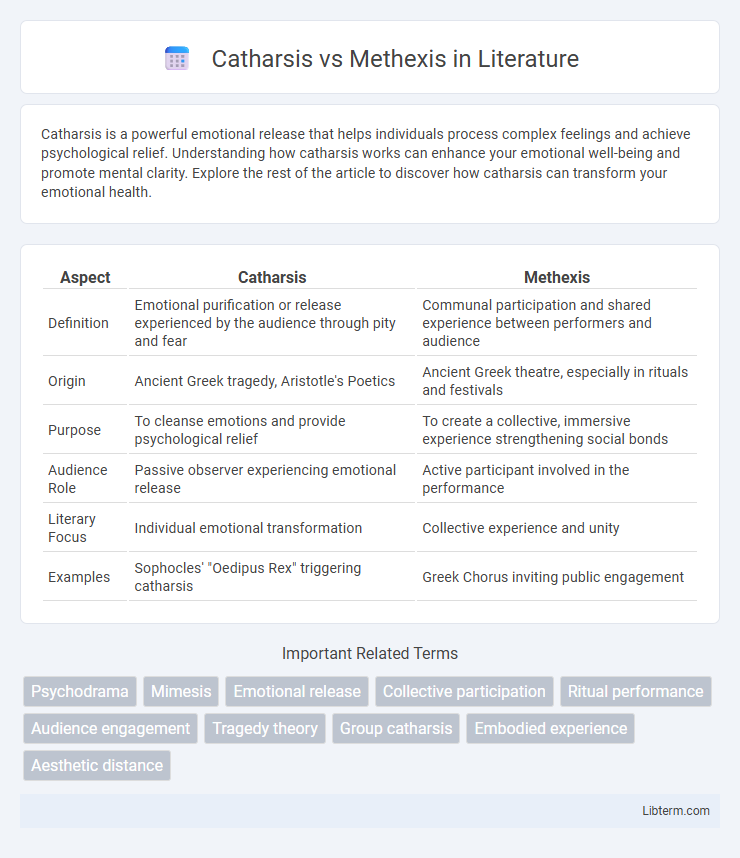Catharsis is a powerful emotional release that helps individuals process complex feelings and achieve psychological relief. Understanding how catharsis works can enhance your emotional well-being and promote mental clarity. Explore the rest of the article to discover how catharsis can transform your emotional health.
Table of Comparison
| Aspect | Catharsis | Methexis |
|---|---|---|
| Definition | Emotional purification or release experienced by the audience through pity and fear | Communal participation and shared experience between performers and audience |
| Origin | Ancient Greek tragedy, Aristotle's Poetics | Ancient Greek theatre, especially in rituals and festivals |
| Purpose | To cleanse emotions and provide psychological relief | To create a collective, immersive experience strengthening social bonds |
| Audience Role | Passive observer experiencing emotional release | Active participant involved in the performance |
| Literary Focus | Individual emotional transformation | Collective experience and unity |
| Examples | Sophocles' "Oedipus Rex" triggering catharsis | Greek Chorus inviting public engagement |
Understanding Catharsis: Definition and Origins
Catharsis, originating from Aristotle's Poetics, refers to the emotional purification or release experienced by an audience through art, particularly tragedy. It involves a profound cleansing of feelings such as pity and fear, leading to psychological renewal and restoration. This concept contrasts with methexis, which emphasizes collective participation rather than individual emotional transformation.
Exploring Methexis: Meaning and Historical Context
Methexis, originating from Greek theater, signifies communal participation where the audience actively engages in the emotional and ritualistic experience of the performance. Unlike catharsis, which emphasizes individual emotional purification, methexis fosters collective involvement that blurs distinctions between performers and viewers. Historically, methexis is rooted in ancient Dionysian festivals, reflecting a shared transcendence and social unity through theatrical expression.
Catharsis in Classical Greek Drama
Catharsis in Classical Greek drama refers to the emotional purification or purgation experienced by the audience through the unfolding of tragic events, especially sentiments of pity and fear. Rooted in Aristotle's Poetics, catharsis serves as a key function of tragedy, enabling viewers to release pent-up emotions and achieve psychological balance. Unlike methexis, which involves collective participation, catharsis is a personal emotional response elicited by witnessing the protagonist's downfall.
Methexis in Ancient Performance Traditions
Methexis in ancient performance traditions emphasizes collective participation and shared emotional experience between the audience and performers, contrasting with catharsis's focus on individual emotional purification. Rooted in Greek theater, methexis fosters a communal bond, where spectators engage actively with the drama, embodying the cultural and ritualistic essence of the performance. This participatory dynamic enhances the social function of theater, transforming it into a collective spiritual and emotional event.
Emotional Release: The Function of Catharsis
Catharsis functions as a powerful emotional release, allowing individuals to purge pent-up feelings through art, drama, or therapeutic expressions. By confronting intense emotions, catharsis facilitates psychological relief and emotional cleansing, contributing to mental well-being. Methexis, in contrast, emphasizes communal participation and shared experience rather than individual emotional discharge.
Collective Experience: The Role of Methexis
Methexis emphasizes the collective experience of participants actively engaging in a ritual or performance, fostering a shared emotional and psychological connection within the group. Unlike catharsis, which centers on individual emotional purging, methexis dissolves boundaries between audience and performers, creating a unified communal involvement. This participatory dynamic enhances social cohesion and collective identity through immersive communal experiences.
Key Differences Between Catharsis and Methexis
Catharsis involves the emotional purification or relief experienced by an audience through the feelings of pity and fear, primarily associated with Aristotle's theory of tragedy. Methexis, rooted in Greek philosophy and drama, refers to the collective participation or shared experience between the audience and performers, fostering a communal connection. While catharsis emphasizes individual emotional release, methexis highlights active engagement and unity within the theatrical experience.
Catharsis vs Methexis in Modern Theatre
Catharsis in modern theatre emphasizes emotional purification and audience release through character-driven narrative arcs, fostering personal reflection and empathy. Methexis involves collective participation and shared experience, inviting the audience to engage interactively with the performance, often dissolving the barrier between actors and spectators. Contemporary productions blend cathartic storytelling with methectic elements to enhance immersive emotional and communal impact.
Psychological Implications of Catharsis and Methexis
Catharsis involves the psychological release of pent-up emotions, often leading to emotional relief and reduced stress, which supports mental health by allowing individuals to process trauma or anxiety effectively. Methexis emphasizes participation and shared experience, fostering a sense of community and collective empathy that enhances social connectedness and emotional resilience. Both concepts play crucial roles in therapeutic practices, with catharsis targeting individual emotional cleansing and methexis promoting communal healing through empathetic engagement.
Contemporary Relevance: Catharsis or Methexis Today?
Catharsis remains a pivotal concept in psychotherapy, particularly in expressing and purging emotional trauma through narrative or dramatic arts. Methexis finds contemporary relevance in participatory theater and immersive experiences, emphasizing collective engagement and shared transformation. Both frameworks inform modern approaches to healing and community-building, blending individual emotional release with communal connection.
Catharsis Infographic

 libterm.com
libterm.com